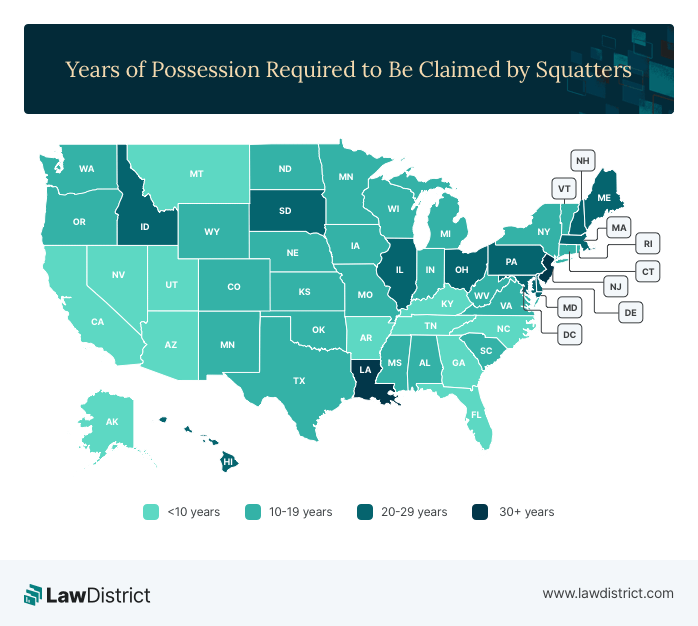
Adverse possession of property — squatters’ rights — is commonly accepted in countries around the world. In fact, much of the American West was settled by pioneers who moved onto vacant land, built a home, and began raising crops or livestock. The U.S. Government ultimately recognized their legal right to the land as homesteading.
Of course, times have changed since the 1800s. Today, squatters aren’t exactly benign homesteaders cultivating vacant land. They tend to be trespassers illegally moving into your property.
But what exactly are squatters’ rights, and how do they vary state-by-state? How do property owners get rid of squatters?
Key Takeaways — Squatters Rights:
-
- Squatters rights, or adverse possession laws, govern how landlords and property owners can remove trespassers after they’ve established residency.
- Squatters rights vary by state law.
- Trespassers can become squatters if they stay long enough and live in the property overtly. They must be evicted, rather than immediately ejected by police.
- If squatters live in the property long enough, they can claim legal ownership of it.
What Is a Squatter?
A squatter moves into a property they don’t own, typically without the knowledge of the owner, and establishes residency there.
In other cases, squatters once had a legal right to live in the property but have now overstayed their invitation, such as a tenant or Airbnb guest who refuses to leave after the rental period ends.
The Rosados, homeowners in the popular summer resort town of Sag Harbor, New York, leased their home for the summer to a successful stockbroker. The renter subsequently quit paying the $3,600 rent and refuses to vacate. According to Mrs. Rosado, “We have a squatter that won’t leave. This is directly affecting our family financially, emotionally.” According to the CBS news report, many homeowners in the area are in the same predicament, unable to evict recalcitrant tenants.
By definition, squatters claim a legal right to live in the property as a residence. If they admit to illegal trespassing, the police can eject them.
What’s the Difference Between Squatting and Trespassing?
If squatters sound like trespassers, well, the line isn’t always clear. But the distinction matters legally: as a landlord you can call the police to throw out a trespasser immediately, but you can only remove squatters through the eviction process.
So at what point does a trespasser become a squatter and gain their rights as tenants?
It varies by state law, but as a general rule, if someone has overtly lived in the property for at least 30 days, they start counting as an unlawful tenant rather than a trespasser. It helps their case if they’ve opened utilities in their own name or listed the address on official accounts such as bank accounts.
At that point, you have to file for eviction, rather than just having the cops throw them out. If a trespasser claims legal residency — even if false — the police often step aside and require you to go through the eviction process.
The risk of squatters is one more reason to check on your vacant properties regularly.
What Are Squatters Rights?
Squatters gain several rights, compared to criminal trespassers.
First, they can only be physically removed from the property by eviction, not by simply asking the police to eject them as trespassers. As a landlord, you have to go through the lengthy eviction process to reclaim possession of your property.
If allowed to openly reside in the property for long enough, squatters can take legal ownership. It’s known as adverse possession, taking legal title to a property without the owner’s consent.
Fortunately for property owners, it takes many years for squatters to take ownership through adverse possession. The exact number of years varies by state law, but typically falls between seven and twenty years. A few states even allow adverse possession in as little as five years.
How to Effectively Get Rid of Squatters
As a general rule, it’s worth calling the police and demanding that they remove trespassers. Property owners can reacquire possession of their property by having the occupant arrested for housebreaking and changing the locks.
If the trespassers go willingly, great. If they claim squatters rights, the police may tell you to go through the eviction process.
Squatters often claim tenants’ rights by asserting they have paid rents, have a signed lease agreement (typically fraudulent), or made an oral agreement with the owner substituting rent payments for performing improvements on the property.
In some cases, property owners resort to “cash for keys” to remove squatters. But that simply encourages squatters to keep pulling this stunt in the future.
What Not to Do While Getting Rid of Squatters
Do not, under any circumstances, perform a “self-help” eviction.
In other words, don’t physically throw the trespassers from your property yourself. Don’t threaten them with physical violence, such as showing up with Vinny and a few guys with baseball bats to “encourage” a hasty retreat. Don’t barricade squatters out of the property, and don’t cut off the utilities.
Call the police, ask them to remove illegal trespassers. If they refuse, file for eviction. End of story.
Steps to Protect Your Property from Squatters
Worried about squatters in your vacant property? Take the following steps to protect vacant rental units.
1. Maintain physical evidence of your ownership including signs, fences, and gates. Evidence of this type is especially important for remote owners who are unlikely to physically visit their property regularly.
2. When allowing another the use of your property, formalize the conditions with a formal agreement that shows your ownership and the conditions under which they can use or occupy the property. Recognize that casual use, such as letting a neighbor cross your property for convenience for a period, might be grounds for a claim of adverse possession.
3. Visit and inspect your property regularly to identify any trespassers. If you are unable to personally inspect your property, hire an agent on your behalf to perform inspections, the contract clearly stating your ownership and your intent in hiring the agent to protect your interest.
4. If evidence of illegal or improper use is discovered, contact law enforcement to investigate and remove any trespassers. If the guilty party is known, engage an attorney to send a formal cease-and-desist letter with a demand for any damages – real or intangible – as the result of the invasion.
5. Pay your property taxes regularly when due and check local records that you are the only person paying such taxes. Trespassers can gain adverse possession by paying taxes for as little as three years in some states.
Adverse Possession, Activists, and Squatters’ Rights
Adverse possession allows a person to gain legal ownership of property without payment if the possession of the property is personal, exclusive, overt, and continuous for a period of time and the rightful owner does not attempt remove the person within a legally defined period.
The law does not distinguish whether adverse possession is intentional or accidental. For example, if a neighbor inadvertently fences a portion of another person’s land and the owner does not object the intrusion (not knowing the exact boundaries), the neighbor can gain legal possession of the land within his fence.
In recent years, poverty activists have promoted squatters’ rights as a “legitimate” avenue for the poor to gain possession of property. In California, community organizer Steven DeCaprio used the state’s adverse possession law to advocate for people experiencing homelessness and to successfully occupy an abandoned home. He founded an organization, Land Action, to help people do the same. ReclaimSF, Moms4Housing, and Chicago’s AntiEviction Campaign are examples of nonprofit’s use of adverse possession to legally take property from the actual owner.
Unfortunately, those out to make a buck on the naivete of those desperate for a home find squatters advocacy a fertile market. Naziyr YishmaEl, formerly known as James Allen Keith, taught a course on adverse possession. For a fee of $75,00, people could become members of his “Association of Autonomous People.” Property owners and prosecutors have a different view: “an opportunist who already had an embezzlement conviction on his record and took advantage of people on the margins during an economic crisis.”
And really: you charge $75,000 and you claim to be serving the homeless and poor?
State-by-State Squatters’ Rights
Each state has enacted laws to protect property owners from adverse possession. A squatter can gain legal ownership of real property in forty-three states by being on the property and treating it as heir own for a minimum of ten years while meeting the following conditions:
-
- The possession must be open and notorious, i.e., occupied without subterfuge or misrepresentation to the public,
- Exclusive, i.e., other parties cannot share the property,
- Adverse or hostile claim to the true owner’s interest, and
- Continuous and uninterrupted for the State’s statutory period.
Seven states require possession for seven years or less, while four others require more than 20 years. Having a deed or paying taxes on the property can reduce the time necessary to gain ownership in some states.

Map courtesy of Law District
Alabama Squatters Rights
Squatters can take possession of property if they have a deed to the property or pay the taxes on the property for 10 years. This rule comes from Title 6 Chapter 5 Section 200 of the Code of Alabama.
Alaska Squatters Rights
A squatter can gain adverse possession with the deed to the property and living on the property for seven years or paying taxes on the land for the past 10 years.
Arizona Squatters Rights
A squatter with the deed and has paid the taxes on your property for three or more years can take adverse possession of it unless the property is a city lot where the squatter needs the deed and pays taxes for five years. If a neighbor builds across your line of the property, he can take the property after two years.
Arkansas Squatters Rights
A squatter gains adverse possession of a property after holding the deed and paying taxes for seven years, according to Arkansas Code Annotated 18-11-102.
California Squatters Rights
A squatter Who pays the taxes on your property for five years can gain adverse possession.
Colorado Squatters Rights
Squatters can take possession of property where they have lived for 18 years with a deed or paying taxes on the property for seven years.
Connecticut Squatters Rights
Squatters who have been living there for 15 years can claim adverse possession.
Delaware Squatters Rights
A squatter earns the right to claim your property after living on it for 20 years.
Florida Squatters Rights
Squatters in Florida who pay taxes on your property for 7 years can claim adverse possession of your property.
Georgia Squatters Rights
Squatters can gain possession of the property by living on the property for 7 years or more except for undeveloped land where minimum occupation is 20 years.
Hawaii Squatters Rights
An individual must occupy a property for at least 20 years before the possibility of ownership.
Idaho Squatters Rights
Squatters can make an oral claim for possession after paying the property taxes on a parcel of land for a minimum of 20 years.
Illinois Squatters Rights
Squatters must overtly occupy a property without permission for a minimum of 20 years and pay taxes for 7 years to be given the chance to transfer the deed.
Indiana Squatters Rights
To gain adverse possession, a squatter must occupy a neglected property openly for at least 10 years.
Iowa Squatters Rights
Adverse possession is possible after 10 years of open possession.
Kansas Squatters Rights
Kansas law requires a squatter to be in actual possession of the property for at least 15 years continuously.
Kentucky Squatters Rights
Adverse possession can occur if a squatter occupies the property for 15 years and establish Color of Title for 7 years.
Louisiana Squatters Rights
Squatters must have continuous possession of the property for 10 years, acting as if it were their own and cannot be convicted of disturbing the peace in any way during possession.
Maine Squatters Rights
A squatter must have continuous and uninterrupted possession for 20 years and either claim of title or the payment of taxes.
Maryland Squatters Rights
The general legal requirements for adverse possession is continuous possession for 20 years.
Massachusetts Squatters Rights
Squatters must have open, actual, notorious, exclusive and ongoing possession for 20 years to claim ownership.
Michigan Squatters Rights
After 15 years of overt possession, a squatter cam gain possession of property but must to court to receive legal title.
Minnesota Squatters Rights
Squatters must have open, actual, obvious, exclusive, and continuous possession of property for 15 years to claim adverse possession.
Mississippi Squatters Rights
Squatters must have open, obvious, and exclusive possession of the property and use the property in an uninterrupted fashion for a minimum of 10 years for adverse possession.
Missouri Squatters Rights
A squatter must retain continuous possession of the property for a minimum of 10 years.
Montana Squatters Rights
Squatters must maintain continuous possession of the property for a minimum of 5 years.
Nebraska Squatters Rights
The state requires squatters to have continuous, open and notorious possession of the property for 10 years.
Nevada Squatters Rights
Squatters are required to be on the premises for a minimum of 5 years before seeking adverse possession.
New Hampshire Squatters Rights
Squatters need to maintain continuous possession of the property for at least 20 years.
New Jersey Squatters Rights
In New Jersey, squatters must occupy the property for 30 years before making a claim of adverse possession. In the case of woodlands; squatters must occupy it for 60 years.
New Mexico Squatters Rights
A squatter must occupy the property for 10 years with apparent title and payment of property taxes for 10 years.
New York Squatters Rights
Squatters must live on the property openly and illegally for a period of at least 10 uninterrupted years to claim adverse possession. In New York City, a previous tenant can gain squatter’s rights just 30 days after their lease term has ended.
North Carolina Squatters Rights
Continuous possession of the property for 20 years is required to claim adverse possession except in cases where the squatters have a justifiable reason to believe they own the property. In the latter case, the time requirement drops to 7 years.
North Dakota Squatters Rights
A squatter must occupy the property for 20 years or have an implied title or paid taxes for 7 years to claim adverse possession
Ohio Squatters Rights
Squatters must live on a property for 21 years without permission, openly and obviously, to make an adverse possession claim.
Oklahoma Squatters Rights
A squatter must occupy the property for 15 years to claim adverse possession.
Oregon Squatters Rights
In Oregon, 10 years of occupancy is required before making an adverse possession claim.
Pennsylvania Squatters Rights
The statutory period of occupation required to claim adverse possession is 21 years.
Rhode Island Squatters Rights
Squatters must occupy property for 10 years before making an adverse possession claim.
South Carolina Squatters Rights
Squatters must occupy the property for a statutory period of 10 years.
South Dakota Squatters Rights
A squatter must occupy the premises for 20 years to claim adverse possession/color of titleor have paid taxes for 10 years to claim adverse possession
Tennessee Squatters Rights
A minimum of 7 years of possession with implied title or 20 years of occupancy without title is required to claim adverse possession.
Texas Squatters Rights
A continuous period of 30 years occupation by a squatter is required to claim adverse possession.
Utah Squatters Rights
The statutory period of occupation before a squatter can claim adverse possession is 7 years.
Vermont Squatters Rights
A squatter must reside on the property for a minimum of 15 years before applying for adverse possession.
Virginia Squatters Rights
A squatter must occupy property openly and illegally for a minimum of 15 years before making an adverse possession claim.
Washington Squatters Rights
Occupation of property for a minimum of 10 years is necessary to claim adverse possession.
Washington D.C. Squatters Rights
A squatter can claim adverse possession of your property after squatting in the unit for 15 years.
West Virginia Squatters Rights
Adverse possession requirements including a 10-year period of occupation must be met to make an adverse possession claim.
Wisconsin Squatters Rights
A squatter must possess the property in a way that is hostile, exclusive, open, notorious, continuous and uninterrupted for 20 years to claim adverse possession.
Wyoming Squatters Rights
Squatters must occupy property for a minimum of 10 years before making an adverse possession claim.
FAQs on Squatters Rights and How To get Rid of Squatters
If you still have questions about squatters rights, well, you’re not alone. Here are some common questions and answers about squatters’ legal rights.
Do squatters pay property tax?
In some cases. It largely depends on whether that state requires it for adverse possession.
Squatters may fail to pay property taxes while they’re squatting and not paying rent. But after they take legal ownership of the property, they have to pay property taxes like any other landowner. If they fail to do so, the county will sell the tax lien or tax deed.
I have “No Trespassing” signs up, but someone moved in without my consent. Is this legal?
No, but that doesn’t mean you can necessarily have them removed as trespassers. If they’ve been there long enough, the police might force you to file in court for eviction.
Will a squatter have grounds for an adverse possession claim if they do not meet the five requirements?
Generally speaking, squatters must meet all requirements in order to successfully file for adverse possession.
How does a squatter have rights with no lease?
Because the government gave them those rights. You can thank the homesteaders of the 1800s, back when huge swaths of land were unoccupied.
What state has the shortest squatters rights?
California, Montana, and Nevada allow adverse possession in as little as five years.
How Do Squatters Claim Adverse Possession?
The exact process of adverse possession varies by state, but in general, the occupying squatter files a legal motion in the local courthouse to unilaterally transfer the deed into their name.
Final Thoughts
The COVID-19 pandemic and eviction moratorium made it far harder for landlords to enforce their lease agreements. While both have ended, squatting remains a problem in many parts of the country.
Know your rights as a property owner, and know your legal limitations. If you want to win the landlord-squatter battle, you need to know the ground rules.
Most of all, act swiftly if you suspect a squatter has taken up residence on your property. The longer you ignore the problem, the more entrenched the squatters become, and the more rights they gain.
Have you ever had to evict squatters? What are your experiences during the coronavirus pandemic with non-paying tenants?
The More You Learn, the More You Earn as a Landlord:
About the Author

Michael Lewis is a landlord, entrepreneur, and personal finance expert. He reached financial independence and semi-retired, but loves writing and helping others build wealth – so he keeps doing it! Connect with him at MichaelRLewis.org to talk entrepreneurship, writing, or building wealth one brick at a time.



























I’m not sure why squatters have rights. It’s sad how one sided and irresponsible some people can be. While they live rent free, the person that owns that property is still paying the mortgage. We are not all made of money, but I would certainly not sit back and scam the system and then blame the people that are paying for that property for taking away your rights. Doesn’t make any sense to me.
I hear you David. It was a useful way to allow settlers to claim land back in the 18th and 19th centuries, but those days are ancient history today.
What about the right to beat arms and protect your property?
If these strangers threaten you, shouldn’t you have the right to apprehend them to protect your property?
Different states have different laws about the degree to which you can defend your property against intruders. But as a general rule, you need to call in the authorities, and in most cases you have to file eviction against squatters.
Hi Michael, absolutely amazing content!!! Every step of squatters’ rights has been explained in a very detailed way, making it easier for everyone to understand. I myself own a property management company. So, it was very helpful
Thanks Scott, glad to hear it was useful for you!
There should be strict rules and regulations for squatters right. Absolutely loved the content and was very helpful and interesting. Would love to hear more from your site
Thanks Yukta!
My neighbors have family living outside their fence in cars, having somthing to do with a will, is this legal?
You could always report it to the police and see what they do. Definitely ask to remain anonymous though!
I own my hone but not the land,,if the landowner passes,away,when i get,evited as,I have lived on this land for 20 years,,also disabled,,Can his grandkids make me move!! I have never had to pay,the landowner NOTHING for living here,for having my mobile home here which I own,it,I’m 62 years old,and this,worries me!!!
Hi Tammy, you could always sign some sort of long-term contract with the owner to allow you to stay for a certain number of years, even if he passes away. Otherwise, when the ownership changes, the new owners may not be so generous.
Hello if a squatter leaves for 2 nights with all his personal property does he loose his rights to my house?
Can a person claim squatters rights in an Elderly Handicapped housing building? The person that has a lease still lives there and her unruly house guests are all claiming squatters rights after a month and a half. Is this considered squatters rights? This is in Maine USA.
Try removing them as trespassers. If the police refuse to remove them and insist you file for eviction, you’ll have your answer. Often if people are allowed to settle in for a month and a half, they gain squatters’ rights.
I live in central/upstate NY and have been staying on a property for a couple months. It is owned between siblings after their father passed away five years ago…no one was taking care of the property so its been run down quite a bit ive been staying here with permission from one of the deceased children’s but one of the other owners is refusing to pay taxes on it and is the main person I charge of it all and is going to let the state take it for back taxes do I have any rights to stay here… I do want to be a decent human and pay for my staying here but that’s after the water is running again of course…I have put many hours of my own hard work into maintaining the property is there risk of me being thrown out immediately and what can I do to keep this from happening.
Hi Andrew, one option is starting to pay the property taxes yourself. Another is signing a formal lease agreement or purchase contract (or installment contract) with the owners. Best of luck!
There are squatters on the house I am fixing won’t leave! Authorities already know the situation and I am just hoping that they hurry the eviction process. The house is almost furnished and I am getting worried of additional costs if they damage the house.
I’m so sorry to hear that Bianca. Hope you can get them out quickly.
I have been paying 875 a month with deposit of 900 and 100 per deposit- my question is regarding tenants liability for plumbing costs- I am terminal with loss of smell from tumors and was unable to smell the scent of sewage penetrating the. Mobile home until my three year old grandchild enlightened me .Approximately a week later the plumbing physically gave way to flooding when washer in use and toilets began having to be plunged – when it was evident this was not incidental clogging I contacted owners – it was during holiday so in leu of constant overflow I borrow snake and thought after much effort resolved issue until I heard water dripping when none was on – by time plumber was available after new year – I was told by plumber the pipes were in connected and was from incompetent plumber- while he took photos and sent to owners I dissolved wipes( which I know now flushable wipes still should be avoided) – was told after I had to contact owner after plumber finished that I used washer and it all started again – she told me of photos and that I would be billed for their time to try and resolve it myself until they could come- following day two plumbers showed apparently on clock fee vs after hours side job they initially had used- I had used liquid plumber and plunged as she said then when I had to cancel my out of town appt to tend to plumbing entire day billed to me – I still had to snake one of the tubs after they left – my question is simple -Can I be held liable for Shawshank plumbing in state of New Mexico – this is my final month of year lease and owner is aware of my intended move out day to be date on lease. I was told I would be billed w next months bill? Is this their way of absorbing all 900 deposit ? If plumber bill exceeds 700 since 200 was understood to be deducted for paint regardless am I to be required to pay this as well as losing deposit? Thanks sorry for length of question -Be Well NM tenant